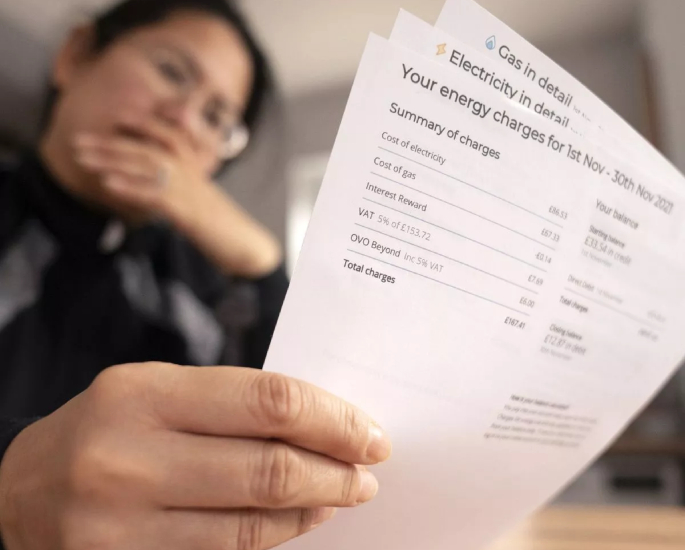"It feels like there's no relief in sight"
As the days grow shorter and winter approaches, households across the United Kingdom are experiencing a mix of anticipation and trepidation towards a new energy price cap.
While there’s a glimmer of hope in the form of falling energy prices for the next three months, concerns linger on the financial challenges that lie ahead.
The vigilant oversight of the energy regulator Ofgem has led to a drop in the annual energy bill for a typical household, offering a welcome respite from the relentless rise in costs.
However, this respite may be short-lived, as government support wanes, and forecasts predict a rebound in energy bills come January 2024.
The annual energy bill for a typical household is poised to shrink to a more manageable £1,923, a welcome £577 decrease compared to the winter of 2022.
However, it’s worth noting that financial hardship is far from banished.
Some government support has been pulled back, and the forecast suggests that energy bills will rebound at the start of 2024.
But all is not lost; for some, cost-of-living payments may offer a glimmer of hope to offset the impending energy price surge.
As the public came to terms with this news, we spoke to British Asians across the UK to get their thoughts and reactions.
What is the New Energy Price Cap?

Matthew Cole, the head of the Fuel Bank Foundation, a charity that assists those on prepayment energy meters, expressed grave concerns.
He highlighted the struggles faced by these individuals who may need to allocate around £250 a month just to keep the lights on.
For some, this dire situation could lead to unthinkable choices, like skipping meals or showers. Cole stated:
“For prepaying customers, when the money on the meter runs out and there’s no means of topping up, so does the energy.
“No money equals no heat, hot water or fuel to cook a hot meal.”
But what exactly is this new energy price cap, and how does it work?
Ofgem’s price cap has an impact on 29 million households in England, Wales, and Scotland.
They limit how much suppliers can charge for each unit of gas and electricity, although it doesn’t control the total bill.
For a typical household using a typical amount of gas and electricity and paying by direct debit, the annual bill has now been capped at £1,923, down from £2,074.
Specifically, gas costs 6.89p per kilowatt-hour (kWh), while electricity stands at 27.35p per kWh.
These calculations are based on an estimated usage of 2,900 kWh of electricity and 12,000 kWh of gas.
Unfortunately, those who pay their bills quarterly, often via cheque, will find themselves paying £129 more annually than those using direct debit.
Meanwhile, Northern Ireland operates under a different system of price regulation.
As we reminisce about the previous winter, it’s worth noting that bill increases would have been even more painful if not for the government’s Energy Price Guarantee, which limited the typical bill to £2,500.
Additionally, households received £400 of support over six months. In 2023, however, there’s been no word of a comparable scheme.
Analysts at energy consultancy Cornwall Insight predict that the typical annual bill will rebound to £1,996 come January 2024, leaving many concerned about high bills.
A coalition of 140 organisations and MPs is urging the government to consider introducing a social tariff to support the most vulnerable.
A spokesperson for the Department for Energy Security and Net Zero acknowledged the challenges, stating that the government was providing targeted support.
3 million households are expected to benefit from the £150 Warm Home Discount, and millions of vulnerable households will receive up to £900 in additional cost-of-living payments.
British Asian Reactions

We spoke to some British Asians in order to get a better understanding of how they feel about the new energy price cap and how they will deal with the upcoming winter.
Shapia Kaur, a mother of four from Newport, shared her experience to the BBC, saying:
“Balancing my money has been pretty much impossible.
“The biggest problem has been my water and energy bills.
“I had to re-think everything and budget hard to make the household work and to stay warm, but over the months and years, small debts have grown bigger.
“The biggest problem has been my water and energy bills.
“The price hikes of last year and the heating going on again in October this year have and will continue to hit me hard.”
42-year-old Raj Patel from Birmingham said:
“I’ve been worried about my finances for a while now, and these rising energy bills aren’t helping at all.
“It’s been a tough year, and with winter approaching, it feels like there’s no relief in sight.”
Fatima Khan from Manchester added her views:
“I thought the drop in energy prices would be a relief, but with everything else going up, it’s still a struggle.
“It’s hard to plan for the future when your bills keep fluctuating like this.
“I’ve got a toddler and just had a newborn baby.
“I thought we would be able to deal with our bills but I’m scared of what this government will throw at us in the new year.”
Ali Ahmed from Glasgow expressed:
“I live in Glasgow, and I’ve been dreading the winter bills. This news just makes it worse.
“It feels like we’re constantly being squeezed by rising costs.”
Yasmin Patel from London said:
“It’s a constant worry. The prices may drop now, but what about the future?
“Will we ever get a break from these financial worries?
“I had to use the government schemes earlier this year and my son had to go on universal credit, along with his job because he’s not being paid enough.
“I told him to save whatever money he’s making but he said he wanted to help with the bills.
“As a parent, why are our young children being forced into these situations and trying to survive? It’s horrible.”
45-year-old Immy Hussain from Liverpool also commented:
“I’m concerned about how this will affect my family.
“We’ve been doing our best to manage, but it’s becoming increasingly difficult.
“We’ve just about survived this year, having a shop of our own and doing what we can.
“Even though the next few months look okay, will this come back to bite us harder?
“I feel like this government or the energy companies try and sugarcoat the real situation.
“We have to think about our business and then worry about our own bills at home. It’s too much”
Ria Shoal from Birmingham said:
“It’s not just about the numbers; it’s about the impact on our daily lives.
“We have to make tough choices, like whether to heat our homes or put food on the table.
“There’s always something constantly going on and to be worried about.
“I’ve got so many elders in my family and when they try to get support from companies, they’re offered nothing”
Usman Malik from Newcastle also provided his thoughts:
“I’ve been trying to save energy where I can, but it feels like a losing battle.
“It’s frustrating to see my bills keep going up, even when I’m being mindful of my usage.”
Samina Khan from Leeds added:
“This winter is going to be a real test of our resilience.
“It’s about being smart with our choices.”
Finally, Sajid Ahmed from Sheffield said:
“The uncertainty around our energy bills is causing a lot of stress. It’s not just the cost; it’s the unpredictability that’s challenging to deal with.
“How are we supposed to deal with our energy bills when prices are always chopping and changing?
“We can’t plan our lives because we’re constantly on edge about what we can afford. This is no way to live.
“I’d rather them just keep the prices fixed, even if it means paying more.
“At least then we know we’re not being overcharged or undercharged.”
There’s a definite worry amongst British Asians about the uncertainty of energy bills and the cost of living.
Whilst the new energy price cap does offer a bit of relief, it hasn’t deterred these individuals from worrying about the future.
Money Saving Tips

To help you weather the energy cost storm, environmental scientist Angela Terry, founder of One Home, a social enterprise that shares green, money-saving tips, offers some advice.
As per the BBC, she explained some steps you can take to manage or even reduce your bills:
- Consider switching to a water-efficient shower head, available free of charge from your water company, and opt for showers over baths.
- A loft insulation, which costs around £680 for a typical semi-detached home could save you £285 a year on gas bills.
- Hang your laundry outside instead of using a tumble dryer, and walk instead of driving.
- During gusty weather, check for drafts in your house. Wet your hand’s back to detect them, and then apply insulation or draft-proofing tape.
- Where available, press the smaller button on your toilet to use less water when flushing.
In these uncertain times, it’s crucial to be mindful of your energy usage and make the most of every opportunity to save
As the chill of winter sets in, the financial concerns of British Asians and households across the UK remain palpable.
The temporary drop in energy prices is indeed a silver lining, but it masks the underlying challenges of the ever-increasing cost of living.
The stories and worries of individuals reflect the struggles that many face as they try to make ends meet.
The government’s role in providing targeted support, such as the Warm Home Discount and cost-of-living payments, is acknowledged.
However, a more comprehensive solution may be needed to address the cumulative impact of high energy bills over the past years.






























































